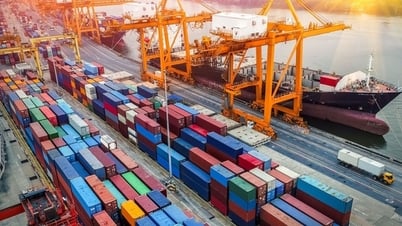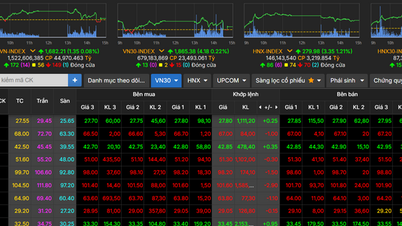In the first 6 months of this year, the average consumer price index increased by 3.27% compared to the same period last year, under control. Some experts predict that in the last 6 months of the year, inflationary pressure will not be high, but the task of controlling inflation will still face challenges because of many potential factors that put pressure on prices. However, if management is done well, the average inflation this year is forecast to still reach the target set by the National Assembly .

Prices increase and decrease alternately
According to new data released by the General Statistics Office ( Ministry of Finance ), the average consumer price index in the first 6 months of 2025 increased by 3.27% over the same period last year. Core inflation was at 3.16%.
Dr. Nguyen Ngoc Tuyen, former Director of the Institute of Economics and Finance (Academy of Finance), assessed that the average consumer price index in the first 6 months of 2025 had a lower increase than in 2023 and 2024; meanwhile, the Gross Domestic Product (GDP) in the first 6 months of 2025 had an increase of 7.52%, much higher than 3.91% in 2023 and 6.64% in 2024. The above results show that price and market management in 2025 has been and is being implemented more effectively and better than in previous years.
Forecasting inflation in the last 6 months of the year, economist, Associate Professor, Associate Professor, Dr. Ngo Tri Long said that the consumer price index in the first half of the year was under control, but the last 6 months of the year are forecast to face many inflationary pressures from fluctuations in oil prices, exchange rates and adjustments in public service prices. Inflation in Vietnam in 2025 will fluctuate between 4-4.5%, in line with the target set by the National Assembly.
Meanwhile, Dr. Nguyen Duc Do, Deputy Director of the Institute of Economics and Finance (Academy of Finance), commented that inflationary pressure will not be large due to the factors that cause prices to increase and decrease intertwined. The factor that causes prices to increase is the exchange rate, in addition to the sharp increase in money supply and credit. However, in the second half of 2025, there will also be many factors that help control inflation such as exports facing many challenges in the US market (due to tariffs) as well as in other markets (due to low economic growth), which will make the domestic supply of goods more abundant, helping to reduce inflationary pressure.
In addition, basic commodity prices are trending down in the context of the global economy forecast to slow down significantly due to tariffs. In other words, the challenges to Vietnam and the world's growth will also be factors that help prevent price increases in the second half of 2025.
“The consumer price index growth rate in the second half of 2025 will not be large. Assuming that the consumer price index in the last 6 months of the year increases by an average of 0.27% per month, equivalent to the average increase in the last 6 months of the 2015-2024 period, the average inflation for the whole year of 2025 is forecast at 3.4%. In case the trade tension between the US and major partners lasts for a long time, leading to a global economic recession and a sharp decrease in prices of basic goods, the average inflation for the whole year of 2025 may be only at 3%,” Dr. Nguyen Duc Do predicted.
Reasonable adjustment of prices of goods and services managed by the State
According to the Price Management Department (Ministry of Finance), although there are some factors that help reduce pressure on price levels, the second half of 2025 still has many potential factors that put pressure on prices, such as: Vietnam is a country that imports a lot of raw materials for production, so high world commodity prices will affect costs and prices, creating pressure on business production; thereby pushing up prices of domestic consumer goods.
In addition, military conflicts and increasing global trade competition have caused unpredictable fluctuations in raw material prices, including energy prices, which could push up commodity costs. Not to mention, the prices of some construction materials whose supply depends on natural exploitation such as sand and construction stone may increase due to the impact of promoting disbursement of public investment capital and from the fact that the real estate market may continue to be vibrant in 2025; real estate prices are forecast to remain high due to the impact of the adjustment of the new land price list and some fluctuations in the financial market...
Regardless of the scenario, the challenge in controlling inflation in the last 6 months of the year is still quite large, and we must not be subjective. To achieve the goals set by the National Assembly, according to many experts, it is necessary to control well the macroeconomic indicators that have a direct impact on inflation; continue to operate the currency flexibly; reasonably adjust the prices of goods and services managed by the State such as electricity, medical services, education, to avoid price resonance. Along with that, it is necessary to ensure the supply, circulation, and distribution of goods in full and timely manner, to avoid shortages, interruptions in goods sources, and sudden price increases; to strengthen inspections and checks on law enforcement, and strictly handle violations.
On the management side, the representative of the Price Management Department said that the price management and operation work in the remaining period of 2025 will ensure good control of inflation in the context of strongly promoting resources to achieve the highest economic growth, while continuing to support the removal of difficulties for production, business and people's lives, continuing to implement the roadmap for market prices of public services and goods managed by the State at appropriate levels and doses according to developments in the consumer price index.
To strengthen the management, control and price stabilization in the context of economic fluctuations until the end of the year, the Prime Minister issued Directive No. 15/CT-TTg, dated May 30, 2025, on strengthening compliance with legal regulations on prices, to ensure that relevant agencies, organizations and individuals comply with legal regulations, ensure publicity, transparency and detect and prevent unreasonable price increases, cases of price manipulation and price inflation. Ministries, branches and localities need to resolutely implement measures on price management, control and price stabilization, especially for essential consumer goods and services in accordance with the Prime Minister's direction.
Deputy Head of General Policy and Agriculture, Forestry and Fisheries Department, Price Management Department (Ministry of Finance) Vu Huong Tra:
8 groups of solutions to control inflation

To control inflation according to the targets set by the National Assembly and the Government, it is necessary to implement 8 groups of solutions. In particular, it is necessary to closely monitor the world economic and inflation developments, economic policy adjustments of major countries, especially Vietnam's main trading partners... to assess the impact, propose appropriate response solutions to limit negative impacts on domestic price levels.
In addition, closely monitor price fluctuations in the domestic market, especially for essential consumer goods and services; continue to ensure balance between market supply and demand, especially for food, foodstuffs and essential goods such as gasoline, electricity and important input materials for production...
Along with that, fiscal policy management is coordinated with monetary policy and other policies to contribute to stabilizing the macro economy, controlling inflation, ensuring major balances of the economy...
Former Deputy Director of the Center for Industry and Trade Information (Ministry of Industry and Trade) Le Quoc Phuong:
Consumer price index unlikely to increase sharply in the last 6 months of the year

I think that favorable factors and factors that put pressure on the consumer price index are intertwined. In terms of favorable factors, the macro economy is basically stable, creating room to control inflation; the supply of goods is abundant, not causing large fluctuations in prices.
In addition, in the first 6 months of 2025, general inflation and core inflation were low, facilitating low inflation in the second 6 months of the year, along with continued reduction of value added tax from 10% to 8%, helping to reduce commodity prices. On the contrary, expansionary fiscal policy promotes growth; continued increases in service prices, healthcare, tuition, and electricity are factors that put pressure on the consumer price index.
In the international market, in the last 6 months of the year, the world economy is forecast to continue to be gloomy, and world prices are unlikely to increase. Combining the above factors, in my opinion, the consumer price index in the last 6 months of this year will be unlikely to increase sharply. The average consumer price index for the whole year of 2025 will reach about 3.8-4.2%.
Deputy Head of the Department of Economic and Financial Research, Institute of Economics and Finance (Academy of Finance) Pham Minh Thuy:
Consumer price index in 2025 may increase by 3.3-3.9%

Vietnam's average consumer price index in the first 6 months of 2025 increased by 3.27% compared to the same period in 2024. This is an average consumer price index increase in the past 10 years (2016-2025). The average consumer price index in 2025 compared to 2024 may increase by 3.3-3.9%.
The reason I make this forecast is because the average price of goods on the world market in 2025 may decrease by 4-7% compared to 2024, of which crude oil prices may decrease by 6-10%. The world economic situation may have instability and unpredictability, causing the price of raw materials and fuels on the world market to fluctuate very unpredictably.
Domestically, competent authorities will adjust the prices of some state-managed goods according to a predetermined roadmap. This will have a ripple effect, increasing the consumer price index. In addition, natural disasters in the country may develop complicatedly and will cause fluctuations in the market and prices of goods...
Ngo Huong recorded
Source: https://hanoimoi.vn/kiem-soat-lam-phat-6-thang-cuoi-nam-van-con-thach-thuc-708998.html



![[Photo] Chairman of the National People's Congress of China Zhao Leji begins official visit to Vietnam](https://vphoto.vietnam.vn/thumb/1200x675/vietnam/resource/IMAGE/2025/8/31/fcfa5a4c54b245499a7992f9c6bf993a)
![[Photo] First Secretary and President of Cuba begins State visit to Vietnam](https://vphoto.vietnam.vn/thumb/1200x675/vietnam/resource/IMAGE/2025/8/31/f169c1546ec74be7bf8ccf6801ee0c55)


![[Photo] Prime Minister begins trip to attend SCO Summit 2025 in China](https://vphoto.vietnam.vn/thumb/1200x675/vietnam/resource/IMAGE/2025/8/31/054128fff4b94a42811f22b249388d4f)
![[Infographic] Traditional relations and special friendship between Vietnam and Cuba](https://vphoto.vietnam.vn/thumb/1200x675/vietnam/resource/IMAGE/2025/8/31/c4c2b14e48554227b4305c632fc740af)










![[Photo series] Construction sites that do not take holidays in Dong Nai](https://vphoto.vietnam.vn/thumb/402x226/vietnam/resource/IMAGE/2025/8/31/a66321c83e8c4347a7a12e0e087d0558)
















































































Comment (0)